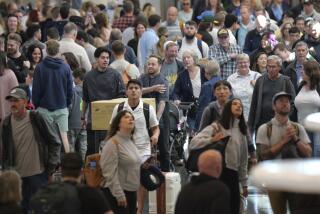Shuffling Flights Will Not End Airport Delays, Airlines Warn
- Share via
WASHINGTON — The nation’s airlines met Monday to try to cut delays at busy airports in Chicago, Atlanta, Philadelphia, Dallas and Newark, N.J., but they warned that shuffling flight schedules will not solve the problem.
Bowing to government pressure, airline representatives conferred at a meeting called by federal officials, who granted antitrust immunity to the carriers. The talks were limited to arrival and departure scheduling, prohibiting discussion of competitive business practices or prices.
By mid-afternoon, the airlines had agreed to rejuggle 16 flights in and out of Newark and then turned their attention to the more complicated scheduling situation at O’Hare International Airport in Chicago.
The talks, monitored by the Federal Aviation Administration, were expected to last two days.
Bad Weather Major Cause
The government and the airline industry agree that bad weather causes most delays--perhaps as much as 70%. But the FAA maintains that aside from adverse weather, the chief cause of delays is the excessive number of flights.
Officials say too many airlines are scheduling too many flights to popular destinations during peak hours, causing inevitable delays.
William Bolger, president of the Air Transport Assn., the industry group that represents major domestic airlines, said that more air traffic controllers, better government computers and additional airports were the answers to cutting the delays.
“Let there be no mistake--adjusting airline schedules will not solve the delay problem by itself for the simple reason that airline schedules are not the major cause of delays,” Bolger said at the meeting.
“To the extent that the government has failed to recognize and keep pace with the growth of air travel over the years, we have, and likely will continue to experience, delays.”
Delays at airports in Newark, Dallas and Philadelphia also were topics of discussion, but Denver and Boston, originally proposed by the government to be investigated, were removed from the agenda.
Does Not Seek Freeze
Ed Faberman, the FAA’s deputy counsel, said that the government is “not looking to freeze schedules at any airport, with the exception of O’Hare.”
He said that O’Hare is a high-density airport, the world’s busiest, where the specific number of departures and arrivals already is controlled.
Many of the nation’s largest airlines, including Eastern, Delta, United and American, operate at the O’Hare and Atlanta’s Hartfield International Airport, where representatives made efforts to spread out flights during busy times.
More to Read
Inside the business of entertainment
The Wide Shot brings you news, analysis and insights on everything from streaming wars to production — and what it all means for the future.
You may occasionally receive promotional content from the Los Angeles Times.










